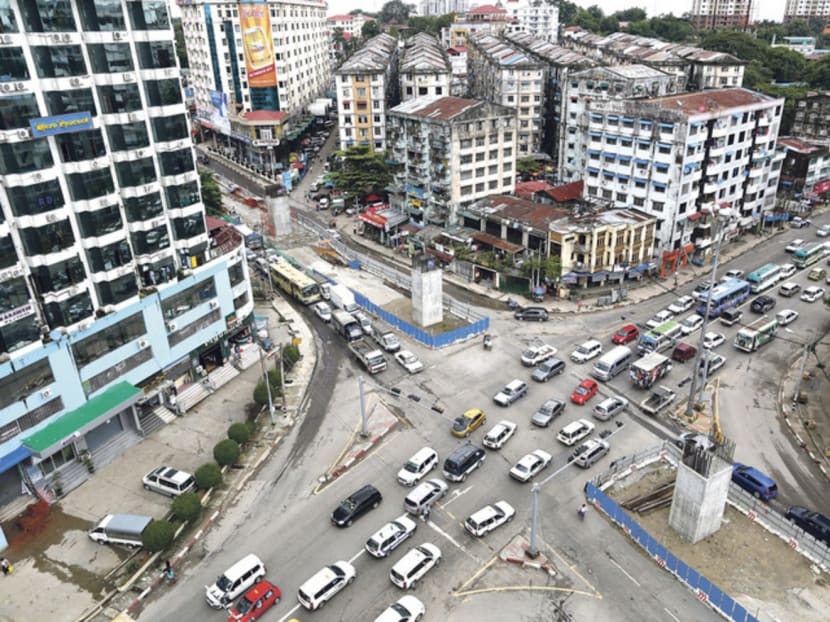Myanmar offers golden opportunities but risks abound
Myanmar has attracted a surge in visitors and investors over the past three years as the country opens up to the world after decades of isolation. The increase in the number of foreign companies and individuals in Yangon has resulted in a sharp rise in property prices and rents.

Shwegontai junction is one of the busiest in Yangon. More Singaporean firms, such as Keppel Land, are taking the plunge into this emerging market. Photo: Reuters
Myanmar has attracted a surge in visitors and investors over the past three years as the country opens up to the world after decades of isolation. The increase in the number of foreign companies and individuals in Yangon has resulted in a sharp rise in property prices and rents.
While some assets are overpriced, there is still room for growth in others, as the immense potential of Myanmar’s economy will remain a draw for investors over the coming years.
More and bigger Singaporean companies are taking the plunge into this emerging market. Last September, a subsidiary of Singapore-listed Oxley Holdings signed an agreement to provide construction, management and consultancy services to build a 20-storey mixed development in the Mayangon township in the northern part of Yangon.
Last month, Singapore’s Keppel Land entered a conditional joint venture agreement with Myanmar’s Shwe Taung Group to develop a 23-storey office tower in Yangon’s central business district, subject to approval from the Myanmar Investment Commission.Keppel Land’s total investment in the project will be US$47.4 million (S$64.1 million).
The Singapore developer will hold a 40 per cent stake in the office tower, which is part of Junction City, a mixed-use development that will include the five-star Pan Pacific Hotel, a shopping centre and residential towers. It will also house Yangon’s largest parking facility with more than 1,400 car-park spaces.
The continued growth of Myanmar’s economy is likely to provide exceptional returns for these firms for being among the first movers in this emerging market.
In particular, Keppel Land’s deal appears to have been concluded at a good price for a locality that has a huge upside: The venue is likely to become the Raffles Place of Yangon.
These transactions have prompted other developers and retail investors to accelerate their plans in looking for investment opportunities in the city.
The rise in interest in Yangon’s real estate and inflow of foreigners have caused prices and rents to surge and this, in turn, has triggered a flood of new construction over the past three years. Even a casual visitor will see that the market is facing a spike in supply of all asset types in the coming four to five years.
Therefore, while the potential of the market is big, investors need to be more selective with the locations they invest in as well as the type of development. Investors, especially those making their first foray into Myanmar, also need to pay attention to detail and learn to navigate around the potholes of this market.
First, note local prejudices, beliefs and rumours, as these can very quickly derail a project. While some investments may look excellent on paper and the Excel spreadsheet, investors must spend time on the ground investigating the locality they plan to invest in.
Second, do not invest purely on the hope of proposed legislative changesthat may spur demand for property. For instance, Myanmar is considering passing the Condominium Law, which is supposed to put in place the mechanisms for strata-title ownership and allow foreigners to purchase property.
On paper, these are excellent catalysts for property prices. Unfortunately, I have heard the refrain “Condominium Law will be passed in the next six months” many times since 2012 and as recently as last month.
Myanmar is taking a very prudent review of many laws that may allow foreign participation in the economy and is very much aware of the need to protect its interests. Thus, an investor may be in for a long wait if the decision to invest is based solely on the hope of gaining from legislative changes.
Third, for those looking for development sites, the opaqueness of the country’s market makes it both a dream and a nightmare.
It is a dream because it provides room to make gains from information arbitrage, but it is also a nightmare as it is close to impossible to determine how much your neighbour paid for his land.
Do not be too discouraged by the typical asking price of US$1,000 per sq ft for any piece of land. Often, a land owner does not know how to price his plot, so the number is only a starting point for the negotiation and this price can be lowered substantially through persistence and establishing trust with the seller.
Fourth, the unlicensed brokerage market has resulted in a situation where almost anyone is a broker who claims to know the owner who knows a certain minister.
So, be selective with the time spent with brokers: It is probable that too many factors remain beyond his control and you may be wasting time with no deal in sight.
Despite these challenges and risks, Myanmar’s property sector will remain one of the most exciting markets to invest in. Its vast economic potential remains largely untapped and Yangon is already very densely built up and populated, which implies that good sites will continue to command a premium.
There are definitely golden opportunities in the market and REMS believes truly Grade A commercial space remains undersupplied.
However, as with gold prospecting, remember to factor in the correct locality and be mindful that not all that glitters is gold.
About the author: Tan Kok Keong is Chief Executive of Singapore-based property consultancy REMS Advisors, which has provided research and advisory services to some of the largest real estate companies in Singapore and Yangon.





